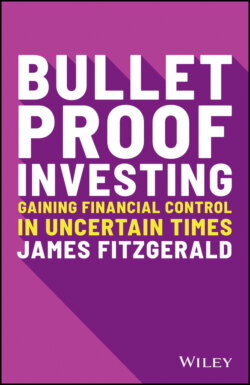Читать книгу Bulletproof Investing - James FitzGerald - Страница 9
CHAPTER 2 Lessons in life and money
ОглавлениеI was born in Tweed Heads, New South Wales, in 1990. I have two younger sisters, Simone and Bridget, who arrived in 1992 and 1995, respectively. My dad — David — grew up in Victoria but moved to Queensland in his role as an area manager for the Target department stores. It was in Queensland that he met my mother, Leanne. They married in 1987.
After a short stint living in Brisbane, Dad was relocated with Target to Tweed Heads. Mum and Dad used some of the profit from the sale of their house in Brisbane (they doubled their money in three years) to buy a four-bedroom home at Carrara on the Gold Coast — perfect timing, given the impending arrival of children. Soon after, they invested the balance of the money in a sports store franchise called Sportsco, with Dad deciding it was time to leave corporate life to create a family business.
The Gold Coast was a wonderful place for kids to grow up and, for many years, the Fitzgerald household was as happy as any family on the eastern seaboard of Australia. Pretty quickly, thanks to their hard work, Mum and Dad were able to invest in a bigger house with a spacious back yard and a swimming pool: nirvana for three active kids.
In my childhood years, I remember regularly visiting my uncle John's house. While my family enjoyed a comfortable, middle-class existence, Dad's brother's house was like Disneyland! It had everything: a pool, tennis court, gym, sauna, games room, lap pool, granny flat and a guest room twice the size of the biggest room in our house. The house alone covered 1000m2, almost four times the size of our home at Carrara, and was set on a magnificent north-facing waterfront block big enough to accommodate a hotel. However, that didn't mean much to me when I was young — at that time it was just a wonderful place to run around in and explore.
Growing up on the Gold Coast and making the most of the outdoor lifestyle, I quickly developed an insatiable appetite for sport. Before, during and after school, I could usually be found kicking a ball of some description around the oval. When I was still very young, I used to dream of becoming a professional footballer. My dad was a huge St Kilda supporter and, during the winter months, we would watch the weekend games together on TV. Pretty quickly I shared his passion.
I also become an accomplished cross-country runner, more on the strength of the volume of kilometres I ran than any innate ability. My high school, Somerset College, didn't offer AFL so in winter I would play rugby union for the school on Fridays, then AFL football for my local club on Saturdays, occasionally doubling up by filling in for the age group above me. There was no such thing as too much sport!
It was almost impossible to play that much sport without being competitive, yet I was never the kind of person to be outwardly competitive or super aggressive on the field. My motivation wasn't so much beating others but being the best I could be. I was driven by my personal growth and improvement, at times restless to move to the next challenge.
My parents generously embraced my dream of becoming a professional AFL footballer, however fanciful it may have been. At the same time, they encouraged me to have a back-up plan ‘just in case’ the ball didn't bounce my way. That was only fair, given they had invested countless thousands of their hard-earned dollars on my secondary school education.
At the age of 15, that back-up plan was to become a physiotherapist, the rationale being that if I didn't make it as an AFL player, I could become the team physio. As I approached the end of school, it was apparent my dreams of becoming a professional footballer were never going to materialise and I didn't like science, which all but put a line through physiotherapy. That left the vexing question: what am I going to do with my life?
At the time, I had a weekend and holiday job at a local car wash and I noticed most of the people getting their cars washed were lawyers and accountants. That was enough to persuade my then 16-year-old brain that I should study law and become a solicitor. I pictured myself defending wrongly accused criminals in court, just like in the movies. I guess a lot of 16 year olds have the same ideological thoughts.
In late 2006, as I was about to enter my final year of high school, my parents announced they were going their separate ways. It was an incredibly challenging time. I was 16 and still finding my adolescent feet, and my sisters Simone and Bridget were just 14 and 11. Dad moved out of our family home and I finished my final year of school living with Mum and the girls. This would have been particularly hard for Mum to manage given that she never fell out of love with Dad. Unfortunately, Dad didn't feel the same way.
Searching for the positives (as my father always encouraged me to do), I think my parents' separation gave me a big dose of resilience and an appreciation of the power of acceptance. Sport can be good like that, too. You play a game each week and either win or lose. Regardless, you turn up to training a few days later and play another game the following weekend. Sport teaches you to move on quickly, accept the losses and self-evaluate: how can I improve? What can I do better next time?
